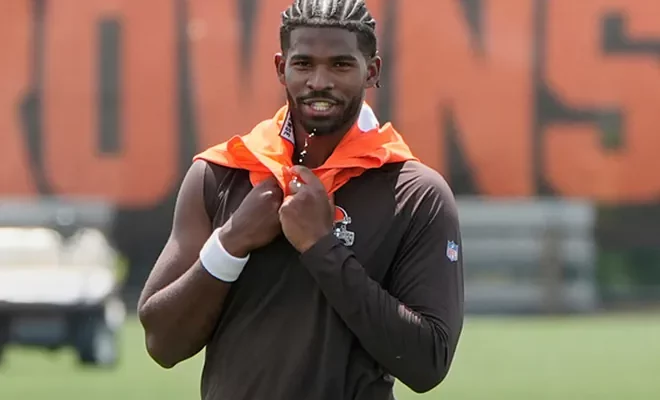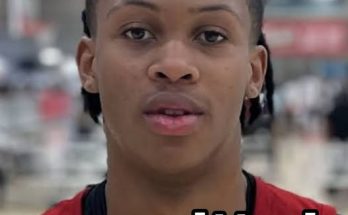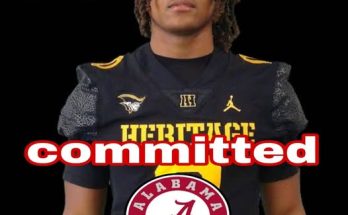The landscape of college football and the broader sports business world has undergone a seismic shift in recent years, and nowhere is that transformation more evident than in the life and career of Shedeur Sanders. As the dynamic Colorado Buffaloes quarterback and son of NFL Hall of Famer Deion “Prime” Sanders, Shedeur has already carved out his own space as one of the most intriguing figures in the game today. But while his on-field accomplishments speak for themselves, it’s what’s written in the fine print of his latest agreement—specifically, a revolutionary clause known as “Prime Equity”—that may ultimately redefine his career and, quite possibly, how athletes are compensated in the NIL and post-college era.
The term “Prime Equity” isn’t just catchy branding. It’s an indicator of something far deeper: a strategic financial stake that links Shedeur Sanders not merely to a paycheck or sponsorship deal, but to long-term, equity-based wealth creation tied directly to his father’s burgeoning business empire. In essence, “Prime Equity” is more than a clause—it’s a financial innovation, and it could make Shedeur Sanders one of the richest quarterbacks in football history, even before he takes a professional NFL snap.
To fully grasp the magnitude of this move, you have to consider the context. Since the NCAA allowed athletes to profit off their name, image, and likeness (NIL) in July 2021, there’s been a gold rush of endorsement deals, brand collaborations, and sponsorships. Most college stars have taken the traditional route: social media promotions, autograph signings, limited-edition apparel. But the Sanders family has always operated differently. With Deion at the helm of a multi-faceted brand that spans sports, fashion, entertainment, and media, Shedeur isn’t just another athlete cashing in—he’s a foundational asset to the family brand. That’s where Prime Equity comes into play.
Sources close to the Sanders family and the Buffaloes program describe Prime Equity as a contractual agreement that gives Shedeur a percentage ownership in various business ventures operating under the “Prime” umbrella. That includes merchandise, media rights, personal branding platforms, documentaries, and even real estate projects tied to the Sanders name. Rather than earning a simple licensing fee for his participation, Shedeur has been granted equity positions—meaning he doesn’t just get paid once; he gets paid repeatedly, as these ventures grow and generate revenue over time.
This is unprecedented. Athletes, especially college ones, have rarely been offered equity in businesses they help build. In the past, sports figures might get endorsement bonuses or stock options in companies they promote, but a structured, ownership-based clause like this is virtually unheard of at the amateur level. For Shedeur, it’s a long-term wealth play that turns each social media post, every televised game, and every Prime-branded jersey into an income-generating event not just for today, but potentially for decades to come.
Critically, this setup reflects the business savvy and foresight of Deion Sanders. Often underestimated as a mere showman, Coach Prime has repeatedly proven he’s playing chess while the rest of the sports world plays checkers. His decision to insert his son into this framework signals a fundamental belief: that value isn’t just about contracts and salaries, but about legacy, intellectual property, and ownership. In an era where athletes are increasingly becoming entrepreneurs, Shedeur may be the prototype of the future—an elite player whose greatest asset isn’t his arm, but his portfolio.
The financial implications are staggering. Early estimates suggest that the Prime Equity clause could eventually be worth tens of millions of dollars if Deion’s media and branding empire continues to grow at its current pace. And given the unprecedented visibility of Colorado football under Coach Prime—complete with Netflix cameras, high-profile celebrity endorsements, and national media attention—it’s not hard to envision these ventures becoming major commercial successes.
Shedeur’s current NIL valuation is already one of the highest in the nation. According to several platforms tracking athlete earnings, he ranks near the top among all college football players, trailing only the most elite basketball stars and quarterbacks. But even those numbers don’t fully account for what Prime Equity represents. This isn’t a temporary NIL deal subject to expiration. It’s a long-term financial stake that ensures Shedeur will benefit not just from his athletic prowess, but from the economic engine his presence helps fuel.
More importantly, the move may spark a revolution across college athletics. Already, agents and financial advisors are scrambling to understand how Prime Equity was structured, and whether it’s replicable for other athletes. Could we soon see USC’s quarterback demanding equity in a media platform or Alabama’s top receiver gaining ownership in a branded apparel line? If so, the Sanders model might become the new gold standard—an evolution that turns the NIL era from a Wild West of sponsorships into a more sophisticated, equity-driven economy.
There’s also a larger cultural dimension to consider. For decades, Black athletes have often been the face of sports empires they didn’t control. They brought the talent, the charisma, the audience—but not the ownership. Prime Equity changes that. It empowers Shedeur Sanders not just to participate in the business of sports but to own a piece of it. That shift is as symbolic as it is financial, signaling a new wave of athlete empowerment grounded in wealth accumulation and generational legacy, not just fame.
Of course, with innovation comes scrutiny. Critics will argue that such arrangements blur the lines between amateurism and professionalism even further. Some will question whether it’s appropriate for a college quarterback to be entangled in complex business dealings while still competing for national titles. There are legitimate concerns about taxes, liability, and fiduciary responsibilities. But the Sanders family appears to have anticipated these critiques. With top-tier legal counsel, financial advisors, and business partners guiding the process, they’ve made it clear: this isn’t a gimmick. It’s a calculated, strategic move rooted in financial literacy and long-term vision.
From Shedeur’s perspective, the advantages are immense. While his path to the NFL still holds enormous potential—he’s considered a legitimate first-round prospect—he’s no longer financially dependent on making it to Sunday. That freedom could actually enhance his on-field performance, allowing him to play with less pressure and more creativity. It also positions him uniquely in NFL negotiations down the line. If and when he enters the draft, he won’t need to accept a lowball rookie deal or chase endorsements just to pay the bills. He’ll already be wealthy—maybe even wealthier than some starting NFL QBs.
This could also influence Shedeur’s decision-making timeline. He might choose to stay in college longer than expected if the value of Prime Equity continues to grow. Why rush to the NFL for a rookie contract when you’re already earning millions with your family’s brand empire and building long-term wealth? It’s a question few college athletes have had the luxury to consider—but Shedeur does.
What’s most remarkable is that all of this is happening while Shedeur remains laser-focused on football. By all accounts, he’s taken his leadership role at Colorado seriously, and teammates praise his work ethic and drive. That duality—athlete and entrepreneur—is becoming more common, but Shedeur may be its most complete representation yet. He’s not just trying to win games; he’s trying to win in life, on every front.
In the end, Prime Equity isn’t just a clause—it’s a paradigm shift. It reflects a new era where the brightest athletes aren’t just stars on the field but titans in the boardroom. Where value is measured not just by touchdowns but by trademarks. And where a quarterback like Shedeur Sanders can become a generational wealth-builder before ever playing a down in the NFL.
If that’s not historic, what is?



